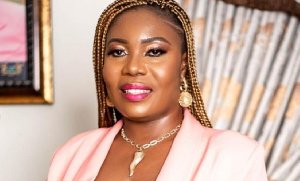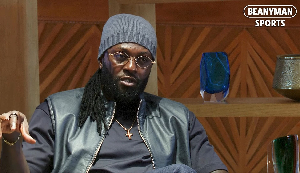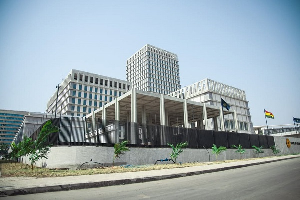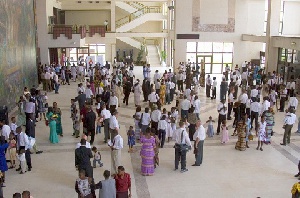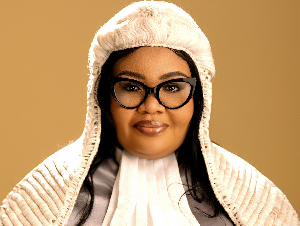That the question of comparative, or relative, greatness should crop up anytime the personalities of Dr. J. B. Danquah and President Kwame Nkrumah are invoked is quite interesting. Quite interesting because such comparisons are almost invariably made out of sheer vanity by people who either feel personally inadequate, for any number of reasons best known to themselves, or people so frustrated with the current leadership as to crave the establishment of what might be aptly designated a ?political pacifier,? an icon, or myth, that assures them of something worthy of their faith or confidence in the destiny of their country. For there can be no gainsaying the fact that Ghana is at a crossroads. Still, whether Danquah or Nkrumah were deemed to be the greater of these two modern Ghanaian political pioneers, pretty much depends on who is making such assessment or judgment call, as it were.
For Kenya?s Professor Ali A. Mazrui, President Nkrumah was a great African but a bad Ghanaian. The basic premise of Professor Mazrui inheres in what the ardent critic of the putative founder of post-colonial Ghana presumed to be Nkrumah?s preponderant attention to the collective destiny of continental Africa at the purported expense of Ghana. In other words, the trend of the preceding argument is that had Nkrumah been a little more ideologically myopic, or micro-nationalistic, then, perhaps, he might also be equally considered to have been a great Ghanaian. And, needless to say, such a critical stance presumes that President Nkrumah would almost definitely have opted to become a little more ideologically myopic, micro-nationalistic, had he known that his broader vision for the collective and organic development of Africa would be held against him as an indelible mark of leadership failure.
The interesting thing about the preceding perspective is that it is flagrantly flawed. For the first Ghanaian prime minister, on the eve of his country?s re-assertion of sovereignty, after nearly 113 years of British colonial rule, emphatically declared, on the Old Polo Grounds, in the Ghanaian capital of Accra that: ?The independence of Ghana [was] meaningless, unless it [was] linked with the total liberation of the African continent,? as well as the liberation of all oppressed peoples globally. The Ghanaian premier was also widely known to identify himself as first and foremost an African before a Ghanaian, and only then as an Akan of Nzema extraction. Of course, Professor Mazrui would, shortly after his violent overthrow, dub President Nkrumah as a failed Leninist Czar. And those fairly familiar with the right-wing Western ideological orientation of the famous Kenyan political scientist, know that to be labeled a Leninist Czar is hardly a compliment. And so barely a year ago, when during a lecture in Accra Professor Mazrui curiously declared President Nkrumah, along with the swashbuckling and sanguinary Flt.-Lt. Jerry John Rawlings, as the greatest leader Ghana had ever had, it came off as quite an amusement. Some of us even felt that Professor Mazrui was up to something hardly noble; perhaps he wanted to insult the intelligence of Ghanaians, presuming these putatively mild-mannered and affable Africans to be woefully amnesiac. Or perhaps the aging Kenyan scholar felt that it would be rather too dangerous to attempt to malign the man who had just then been fittingly and refreshingly rehabilitated by his very own detractors during the course of the preceding decade. In sum, Professor Mazrui must have been trying to act politically correctly.
Significantly, however, the preceding state of affairs does not appear to have been the case. For the government of the so-called New Patriotic Party (NPP) is hardly composed of Nkrumah lackeys, although many of the party?s more mature top-membership echelons appear to have finally arrived at a salutary appreciation of civic responsibility, regardless of one?s ideological persuasion or affiliation. Neither could the eight years preceding the Kufuor administration, the hard-scrabble tenure of the so-called National Democratic Congress (NDC), spearheaded by Flt.-Lt. Jerry John Rawlings, be exactly, or aptly, characterized as having been hospitable to the immense legacy of the founding Ghanaian leader. Indeed, at the very inauguration of the Kwame Nkrumah Mausoleum, Mr. Rawlings had rudely and crudely desecrated the ceremony by insisting that while President Nkrumah could readily be characterized, in some respects, as a great man, it also had to be emphasized that our subject?s was a deeply flawed personality. And so, in a real sense, what has patently facilitated the re-establishment of President Nkrumah as an undisputed Ghanaian patriot of unrivaled pan-Africanist proclivities, is largely the civic maturity of the general Ghanaian populace. And so, in real terms, Ghanaians did not need Professor Mazrui, nearly four decades after the fact, to confirm or affirm for them what we have known all along. But whether Mr. Jerry John Rawlings qualifies to be put in the same class of distinguished leadership as the founding father of post-colonial Ghana, is a wholly different ideological terrain.
There is no objective way of comparing the discrete and equally distinguished personalities of Dr. J. B. Danquah and Prime Minister Kwame Nkrumah, and attempting to do just that may be aptly termed as a tentative ? and virtually futile ? comparison between apples and oranges. What may legitimately be said of these two giants of modern Ghanaian politics, however, is that each was the veritable product of his particular environment and time. It is almost certain that had Dr. Danquah schooled right here in the United States, he definitely would have understood more about the formidable and daunting dynamics of American racism, especially vis-?-vis the destiny of the African-descended person in the 1920s and ?30s. For, it goes without saying that the massive presence of Diasporic Africans here in the United States, and the latter?s radical agitation for the immutable and inalienable recognition of their human rights profoundly educated Prime Minister Kwame Nkrumah in a way that staggered the imagination of the astute and scholarly Dr. Danquah. For it is widely acknowledged that the latter was far and away the more scholarly, even as the former was also far and away the more visionary. For the entire panoply of the Nkrumah legacy is also the story of the proverbial Diasporic African experience; for unlike the more patrician and aristocratic Dr. Danquah, the future Prime Minister Nkrumah immersed himself in the affairs of Black America in a way that his former teacher never had the opportunity to do or experience. Indeed, until I recently began to seriously ponder the matter, it almost invariably reeked of the patently quaint to me ? to speak much less of the outright preposterous ? whenever I heard any talk about a purported Danquah-Busia tradition. I mean, one could cast a fleeting glance at the Akosombo Dam, the first and most magnificent of its kind at the time, and get an indisputably palpable sense of an Nkrumah legacy; what about the University of Science and Technology (now Kwame Nkrumah University of Science and Technology), as well as that of Cape Coast? And also Adomi Bridge and the world-renowned Accra-Tema-Motorway, to-date, the only world-class vehicular highway of its kind in Ghana. And to think of the fact that at the time of their construction, President Nkrumah was roundly carped for recklessly spending the hard-earned resources of the country.
Still, when we claim Dr. Danquah as the greatest Ghanaian statesman of the twentieth century, it is not wholly without a modicum of substance. Neither does it reek of the ?outright preposterous,? as 80-year-old Mr. Ato Brown, of Cape Coast, would have his audience believe. For as the latter himself readily acknowledges (see ghanaweb.com 2/4/05), ?it is on record that [Dr. Danquah] sat for his London Matriculation Certificate seven times? before obtaining the same. The critic further adds that: ?That was an admirable [and] exemplary spirit of how [generic] man could battle life, against all odds and eventually come out successfully.?
And here, it goes without saying that Mr. Ato Brown?s eloquent testimony attests to the rarefied greatness of Dr. Danquah. Which is why the octogenarian critic appears to harbor no qualms in generalizing the wholly subjective and individual triumphs of his object of vitriol in unmistakably heroic terms; for it is only a national hero whose particular experiences are readily projected onto the collective national destiny or fortunes. And to be reckoned a national hero, is logically to be envisaged as a great personage. As well as to be mythologized, and mythologized he aptly is! And here, it is even more significant to also point out that what Mr. Ato Brown failed to tell his audience is the fact that Dr. Danquah?s genius inheres in the fact that the latter gained admission into the august University of London shortly after graduating from the 10th grade; in other words, Dr. Danquah skipped high school proper; he enrolled into the University of London right from junior high school (and, mind you, we learn about legions of Cape Coast mulattos who were awarded their college degrees as sinecures). He would in due course emerge with a doctoral degree in Law and the Philosophy of the Mind, and be awarded the highest honors of his class. Danquah, it is also significant to note, was the first continental African ever to obtain a doctorate in Law from the University of London. And he appears to have achieved such admirable feat during the six- or seven-year span between 1921 (when he was barely 25 years old) and 1927, when he returned to Ghana.
President Nkrumah, on the other hand, would abandon his doctoral studies at both the Universities of Pennsylvania and Oxford, after having spent a full decade ? 10 years! ? abroad. But here also, it bears reminding our audience that whereas Danquah hailed from the ?most significant Ghanaian family,? and here we are quoting authoritative, British historian Richard Rathbone, Dean of the School of African Studies, University of London, as well as the richest royal family of the time, Kwame Nkrumah came from a relatively poor family, having also been raised by a single mother, following the untimely death of his goldsmith father. And so while Dr. Danquah could readily count on generous remittances from his elder brother, King Ofori-Atta I, Prime Minister Nkrumah could only count on the moral support and unstinted affection of his mother, Madam Nyaniba Nkrumah. And so in a real sense, a large measure of Nkrumah?s political agility, as opposed to Danquah?s purported staidness ? or reserve ? may appear to have emanated from the future premier?s veritably hard-scrabble, formative existence.
The preceding notwithstanding, predicating the comparative greatness of these two leaders on a British Broadcasting Corporation (BBC) survey of continental Africans, does not offer our audience an effective mensural outcome. For such survey invariably is tantamount to a popularity contest. And since President Nkrumah, by virtue of his unbested pan-Africanist dynamism, was the more popular ? and populist ? of the twain, he, perforce, would handily emerge as the greater. But here also, one runs the risk of mensural incongruity, for the simple but unmistakably significant reason that while Danquah and Nkrumah were temporally only a half-generation apart, nevertheless, in cultural and ideological terms, the two figures belonged to two discrete generations, and then two disparate ideological epochs. Danquah represented the fast-vanishing, neo-classical aristocracy that had witnessed its apogee during the latter-half of the nineteenth century, whereas the Aggrey-influenced and American-educated Nkrumah represented the fast-emerging modern era of the twentieth century. Even so, his apparently woeful inability to readily negotiate the labile ? and glaringly treacherous ? but salutary culture of democracy determined that President Nkrumah would ossified and become the tragically proverbial Moses who would espy but never set foot on the Promised Land. Ironically, the latter role would fall to the highly unlikely character of Flt.-Lt. Jerry John Rawlings, the putatively infamous Butcher-of-Lartebiokoshie.

Views expressed by the author(s) do not necessarily reflect those of GhanaHomePage.



